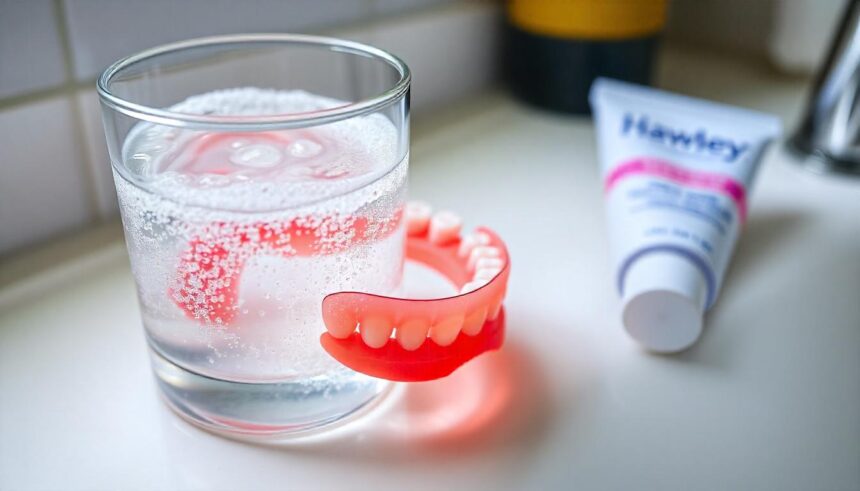Keeping your retainer clean is essential for maintaining good oral hygiene. After all, these little dental devices play a crucial role in ensuring your teeth stay aligned after braces or orthodontic treatment. But let’s face it—cleaning retainers isn’t always at the top of our to-do lists. If you’ve ever wondered how to clean retainers effectively and keep them fresh, you’re not alone. This guide will walk you through everything from daily care tips to deep-cleaning methods that tackle stubborn plaque buildup. Say goodbye to bad breath and hello to sparkling smiles!
The Importance of Cleaning Retainers
Cleaning your retainer isn’t just a matter of aesthetics; it’s crucial for your oral health. Bacteria and plaque can accumulate on these devices, leading to bad breath and potential infections.
Neglecting this task may also result in discoloration, making your retainer look unappealing. An unsightly retainer can affect your confidence when you smile or talk.
Moreover, dirty retainers can hinder their effectiveness. If they’re not clean, they might harbor harmful bacteria that could interfere with the alignment of your teeth.
Regular cleaning helps extend the life of your retainer too. Just like any dental appliance, proper maintenance ensures it stays functional longer while saving you money in replacements down the line.
Prioritizing cleanliness means investing in both your smile and overall well-being. With simple care routines, keeping them fresh is easier than ever!
Different Types of Retainers and Their Cleaning Needs
Retainers come in various types, and each has specific cleaning needs. Fixed retainers are attached to your teeth with wires. They require careful brushing around the wire to avoid plaque build-up.
Hawley retainers, which are removable and made of acrylic, need daily attention. Rinse them after eating and brush gently with a soft toothbrush to keep them fresh.
Clear plastic or aligner-type retainers demand their own routine as well. These can easily become cloudy if neglected. Regular washing with mild soap or denture cleaner helps maintain their clarity.
No matter the type, staying proactive about cleaning ensures they remain effective for preserving your smile. Emphasizing proper care for each retainer type contributes significantly to oral hygiene maintenance.
Daily Care Tips for Retainers
Taking care of your retainer daily is essential for maintaining oral hygiene. Start by rinsing it with lukewarm water every time you remove it. This simple step helps wash away food particles and saliva.
When brushing your teeth, don’t forget to brush your retainer too. Use a soft toothbrush and mild soap or non-abrasive toothpaste. Avoid harsh chemicals that can damage the material.
Storing your retainer properly also plays a crucial role in its upkeep. Always keep it in its case when not in use to protect it from dust and bacteria.
Try to avoid eating while wearing your retainer whenever possible. Chewing may cause scratches or warping, compromising its effectiveness over time. A little daily attention goes a long way toward keeping your smile bright and healthy!
Deep Cleaning Methods for Stubborn Build-Up
Stubborn build-up on retainers can be frustrating. It often results from plaque, bacteria, and food particles that regular cleaning might not remove.
For a deeper clean, start with soaking your retainer in a solution of warm water and mild dish soap for about 15 minutes. Use a soft toothbrush to gently scrub away any residue afterward. This method is effective without risking damage.
Another option is using white vinegar. Mix equal parts of vinegar and water, then let your retainer soak for 30 minutes. Rinse thoroughly afterward to eliminate any lingering taste or odor.
Baking soda also works wonders as an abrasive cleaner. Create a paste with baking soda and water, applying it directly onto the affected areas before scrubbing gently.
Using specialized cleaning tablets designed for dental appliances can provide additional assistance too. Just follow the instructions on the packaging for best results without compromising your retainers’ integrity.
Natural and DIY Solutions for Cleaning Retainers
Cleaning retainers doesn’t have to involve harsh chemicals or costly products. Many natural solutions work wonders in keeping your retainers fresh and hygienic.
Baking soda is a popular choice. Mix a tablespoon with warm water to create a gentle scrub that helps eliminate stains and odors. Simply soak your retainer for about 15-20 minutes before rinsing thoroughly.
Another effective option is white vinegar. Soak your retainer in equal parts vinegar and water for around 30 minutes. This not only disinfects but also removes mineral build-up, leaving it sparkling clean.
For an extra boost, consider using hydrogen peroxide diluted with water as a soaking solution. It’s great for killing bacteria while being safe for most materials used in retainers.
These DIY methods are simple, affordable, and environmentally friendly alternatives to commercial cleaners!
Proper Storage and Maintenance of Retainers
Proper storage of your retainers is essential for their longevity. Always keep them in a clean, dry case when not in use. This helps protect them from dirt and damage.
Avoid leaving retainers in hot places, like a car dashboard or near windows. Heat can warp the material, making them uncomfortable to wear.
Regular maintenance goes beyond just cleaning. Inspect your retainers for any cracks or signs of wear. If you notice anything unusual, consult your orthodontist immediately.
When it comes to daily routines, rinse your retainer with cool water before putting it back in your mouth each time. This simple step can prevent bacteria buildup and keep odors at bay.
Remember that a little care goes a long way in ensuring the effectiveness of your retainer while promoting overall oral health.
Conclusion: Keeping Your Retainer Clean and Maintained for Optimal Oral Health
Maintaining the cleanliness of your retainer is crucial for both your oral health and overall well-being. A clean retainer helps prevent bacteria buildup, bad breath, and potential dental issues. By understanding the type of retainer you have, you can tailor your cleaning routine to meet its specific needs.
Daily care is essential, so make it a habit to rinse or brush your retainer each day. Use gentle solutions that won’t damage the material but will effectively remove plaque and food particles. For stubborn build-up, don’t hesitate to explore deeper cleaning methods that ensure every corner of your retainer stays fresh.
If you’re inclined towards natural remedies, DIY solutions such as vinegar or baking soda can be effective for occasional deep cleans without harsh chemicals. Always remember to store your retainer properly in a case when not in use; this prevents accidental damage or contamination.
By committing to a regular cleaning regimen, you not only prolong the life of your retainers but also promote better oral hygiene practices overall. Taking these steps will help keep smiles bright and healthy for years to come!







